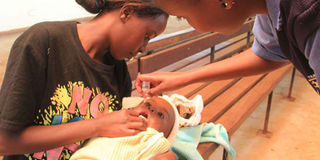Premium
COVID-19 BLOG: Coronavirus will set back immunisation progress

This week is World Immunisation Week. It is a time to promote the use of vaccines to protect people of all ages against diseases. PHOTO | FILE | NATION MEDIA GROUP
What you need to know:
- GPEI supports polio vaccination exercises in East Africa and the rest of the world.
- Another disease that will pose a great risk to children is measles.
This week is World Immunisation Week. It is a time to promote the use of vaccines to protect people of all ages against diseases.
This year’s immunisation week is a little different, however, because of the coronavirus pandemic.
As the novel coronavirus persists, it continues to become clear that the health systems in the country are coming under severe strain.
Through various visits to hospitals and discussion with parents, it is evident that the fear of getting children vaccinated will ultimately cause a rise in the number of unvaccinated children.
BIG SETBACK
Perhaps the biggest setback in vaccination in Kenya is the move by the Global Polio Eradication Initiative (GPEI) move to suspended polio vaccination campaigns. GPEI supports polio vaccination exercises in East Africa and the rest of the world.
In a statement on its website, the initiative calls on countries to postpone mass campaigns until June 1, 2020, after which the decision would be reviewed. The move is meant to divert resources to “prioritize support for the response to COVID-19”.
The statement says that GPEI assets, which include technical expertise, surveillance and community networks and logistics, should be made available to support the global response to Covid-19 for the next four to six months.
HIGHLY INFECTIOUS
Polio is a highly infectious disease caused by a virus that invades the nervous system and can cause total paralysis in hours. It mainly affects children under the age of five.
Shortage and lack of polio vaccines and other vaccines in Kenya put the lives of mothers and children at great risk.
Another disease that will pose a great risk to children is measles, which is a highly contagious virus and remains one of the top vaccine-preventable killers of children.
Reported measles cases worldwide fell from more than 850,000 in 2000 to 132,000 in 2016, largely as a result of increases in vaccine coverage in the world’s poorest countries.
However, in recent years, cases have surged dramatically. In 2018, there were nearly 360,000 cases recorded globally. Provisional data reported to the World Health Organization shows this climbed again in 2019, with almost 430,000 cases reported for the year to date.
A SHORTAGE
Tetanus vaccination is a major component of the strategy to eradicate maternal and neonatal tetanus globally and there has been a shortage of its vaccines since last year.
The last time Kenya witnessed a dip in vaccination was 2017. The 2018 Economic Survey shows the vaccination coverage in 2017 dropped six percent from 69 percent in 2016.
Sixty-three percent is the lowest coverage since 2005.
WORRYING STATS
The survey shows half of the children below one year in eight counties did not receive the compulsory vaccination.
The number of children missing out on vaccines this year is worrying and many experts believe that years from now we could see a surge of diseases that had been fought off.
So far, few children have been vaccinated against easily preventable childhood diseases like measles, mumps, chickenpox and a range of other diseases that can be lethal to young children.
Hospitals around the country have shut down routine vaccination for children, causing panic among parents of possible outbreaks after the country recovers from the coronavirus pandemic.





